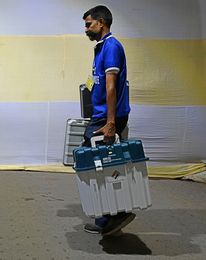No matter who you are or where you live, you deserve the opportunity to choose the leaders who will shape your country’s future. It is this ethos that compels India’s election officers to trek 40km to Malogam village, a remote tract of land in Arunachal Pradesh, bordering China. Malogam is home to Sokhela Tayang—the lone voter in her village, who made her choice at the ballot on April 19, 2024.
In 2024, India’s general election boasted a staggering 969 million eligible voters, solidifying its status as the world’s largest democratic exercise. Electoral laws dictate that no voter should be more than 2km from a polling station, ensuring accessibility. This commitment drives extraordinary efforts, with officials winding their way through Gujarat’s Gir forest for two days to set up a booth for Mahant Haridas Udasin, the sole voter in the area—showcasing the Election Commission of India’s (ECI) commitment to the universal franchise. As a returning officer and ECI representative, I’ve witnessed firsthand the dedication of volunteers. From guiding first-time voters to offering refreshments to those enduring long lines, their actions epitomise the inclusive spirit of our vibrant democracy. India’s election process is a monumental institution in its own right, exhibiting an unmatchable commitment to inclusivity, technology, civic duty, and logistical prowess. In this election cycle, over the course of 1.5 months, 640 million ballots (twice the population of the US) were cast from every type of terrain—ice, desert, swamp, and thick jungle.
Half of the votes were cast by women. Every candidate was safe, every voter was peaceful. In contrast, 37 candidates were assassinated in Mexico’s recent elections. In 2021, the US Capitol Building was attacked by a mob to prevent the final counting of votes. These are all democracies, but each paints a very different picture. In the searing heat, poll workers manned 1.1 million polling booths in India, with 5.5 million Electronic Voting Machines (EVM). For context, that’s more EVMs than the entire population of New Zealand. The sheer size and scale of this democratic exercise, combined with its meticulous attention to safety and technological innovation, make it a marvel of modern governance. India’s deep-seated democratic traditions date back centuries, long before modern democratic states took shape. Ancient texts and historical accounts reveal a rich customs of democratic practices. The scale of India’s elections necessitates cutting-edge technological solutions. The introduction of EVMs in 1982 revolutionised the voting process, making it more efficient and tamper-proof. These machines, coupled with the Voter Verified Paper Audit Trail (VVPAT) system, ensure both digital accuracy and physical verification of votes.
Despite criticisms and concerns about potential tampering, courts have endorsed the security and integrity of EVMs. The ECI’s rigorous protocols, including GPS tracking of vehicles carrying EVMs and VVPATs, make the process undeniably secure. If this election has confirmed one fact, it is that the debate around the safety and efficacy of EVMs must be unequivocally settled—it is a tried, tested, and sound method. In comparison with other democracies, where traditional paper-based voting systems are still employed, India’s EVMs have consistently demonstrated their resilience and accuracy. EVMs offer several advantages, including faster tabulation of results, reduced likelihood of human error, and enhanced accessibility for voters with disabilities. The robust security features embedded within India’s EVMs, such as encryption and tamper-proof seals, ensure the confidentiality of the electoral process.
The indelible ink, a symbol of pride and participation, has marked the fingers of Indian voters since the 1950s. Produced exclusively by Mysore Paints & Varnish Ltd, it is exported to over 25 countries. This enduring mark not only prevents multiple voting, but also fosters camaraderie among voters, symbolising a sense of integrity, civic duty, and pride in the democratic process. As general elections conclude, one truth stands clear: amidst our nation’s diversity, there beats a collective heart. From the Himalayas to the Indian Ocean, every vote cast embodies our democratic spirit, guiding us through the complexities of our time with resilience and strength.
Author is G20 Sherpa. He is ex-CEO, NITI Aayog.


